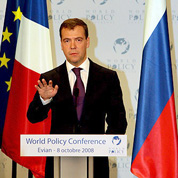Kremlin intensifies calls for a new multipolar world

Speaking at the World Policy Conference in Evian, France in October, President Medvedev called for a new multipolar global order, where decisions on key international issues will be taken in different capitals instead of the current unipolar world, where the United States unilaterally calls the shots and expects other nations — both allies and even foes — to fall in line, even if such policies are at discord with their national interests.
The Russian president buttressed the need to ‘diversify the decision-making processes’ on the premises that the current global crises — from international security breakdowns to the latest global financial meltdowns triggered by Wall Street’s greed — have proved that the global leadership by the United States has totally failed to create a better world. Specifically, Medvedev noted that the U.S. self-styled role as the world’s only superpower has undermined international security, while its egoistic desire to consolidate its global domination has cost it a historical chance to build a new world order after the Sept. 11 attacks.
However, a series of unilateral actions taken by the United States — the invasion of Iraq without UN sanctions and plans to install a missile-defense shield in Europe — have led to the resurrection of ‘the containment policy’ that was once very popular among Western sovietologists. To change these negative tendencies, Medvedev called for a pan-European security pact, which amongst others will ban the use of force and demonopolize security issues in Europe, and replace the current ineffective security system built around NATO and the United States on the continent, especially after its failure to prevent the South Ossetia tragedy.
Medvedev also called for ‘multipolarity’ in solving economic issues, noting that the U.S.-led ‘unipolar economic model’ and its institutional derivatives – IMF, WB, WTO, etc. – have seriously discredited themselves. A broader-based approach to solving the current financial woes and creating a new financial system does not need only include the G8, which has so far failed to accomplish its stated objectives, but also other nations that are increasingly influencing today’s global economy. It does not need an Einstein to know that such multilateral approach to global issues will not only ensure global security and stability of national economies, but also the development of mutually beneficial relations between nations. The only problem is that Medvedev’s speech was delivered to an audience of EU technocrats that are incapable of taking any decision without consulting the United States. Therefore, though it is difficult to fathom out a hypothetical scenario, where Washington will willingly relinquish its current superiority role in global affairs, common sense dictates that Moscow’s proposals should be taken seriously and judged, at least, on their face value.












 Web design,
Web design,